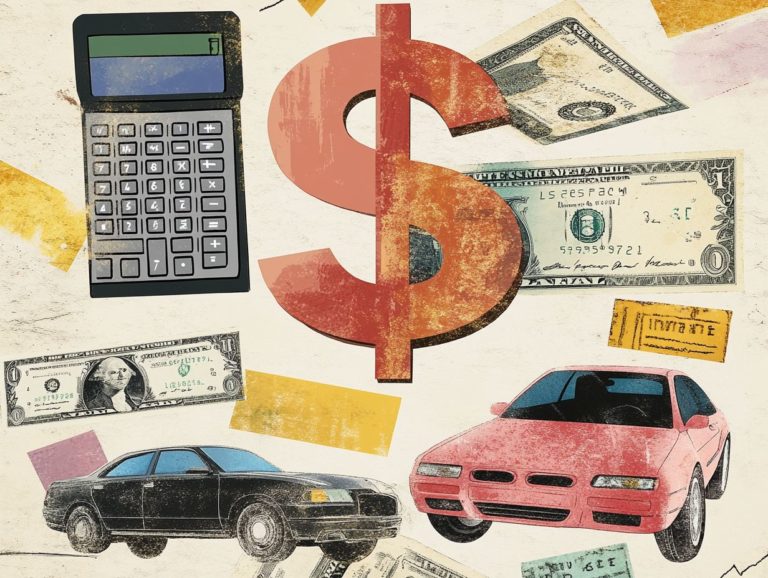Can I Insure a Car Not in My Name?
Navigating the world of car insurance can feel overwhelming, particularly when you’re looking to insure a vehicle that isn t registered in your name.
Whether you re thinking about co-owning a car, assisting a family member, or exploring non-owner policies, grasping the finer details of coverage is crucial.
This article delves into what car insurance truly encompasses, the implications of insuring another person’s vehicle, and the steps you need to take to secure the right policy.
Uncover the key considerations and options that await you!
Contents
- Key Takeaways:
- Understanding Car Insurance
- Insuring a Car in Someone Else’s Name
- Explore Your Options for Insuring a Car Not in Your Name
- What You Need to Know Before Insuring a Car Not in Your Name
- Steps to Insuring a Car Not in Your Name
- Frequently Asked Questions
- Can I Insure a Car Not in My Name?
- What are the conditions for insuring a car not in my name?
- Can I insure a car not in my name if I am not a co-owner?
- Do I need the owner’s permission to insure a car not in my name?
- Is it possible to insure a car not in my name for someone else?
- What happens if I insure a car not in my name without permission?
Key Takeaways:

- It is possible to insure a car that is not in your name through co-ownership or a non-owner policy.
- Before insuring a car not in your name, consider potential risks and benefits and collect necessary documents.
- Understanding car insurance is vital for making smart choices about insuring someone else s vehicle.
Understanding Car Insurance
Understanding car insurance is crucial for every vehicle owner. It offers financial protection in the event of accidents and helps you navigate the often intricate web of insurance requirements dictated by various state laws.
With choices ranging from liability coverage insurance that helps you pay for damages if you cause an accident to personal injury protection, selecting the right policy can shield your assets and provide you with peace of mind.
Understanding insurance companies helps you manage car ownership risks effectively.
What it Covers and Why it’s Important
Car insurance covers damage to your vehicle, liability for others property, and medical expenses from accidents. It s important for all vehicle owners to understand its significance.
You ll want to familiarize yourself with the nuances of different types of coverage. For instance, liability insurance protects you against legal claims that may arise from accidents you cause, while collision coverage takes care of your repair costs after a crash, no matter who s at fault. Comprehensive coverage protects against damages from non-collision events, such as theft or storms. Understanding the limits of your coverage can significantly impact your financial security during unfortunate situations.
Your driving record will play a pivotal role in determining your insurance premiums. Safer driving habits can lead to lower rates, while a history of accidents might drive costs up. As a policyholder, it s essential to be aware of your responsibilities when filing claims to ensure a smooth process and quick resolution.
Insuring a Car in Someone Else’s Name
Insuring a car in someone else’s name perhaps a family member or friend can be quite a nuanced endeavor. It demands a comprehensive grasp of the intricate insurance requirements and the implications of transferring vehicle registration.
This is especially crucial when borrowing cars or when a caregiver is involved.
Possible Scenarios and Considerations

When you find yourself insuring a car that isn t in your name, various scenarios come into play, like borrowing a friend s ride or covering a vehicle owned by a caregiver. Each situation brings its own unique considerations and financial implications.
Such circumstances call for a thorough evaluation of your insurance coverage options to ensure you have the protection you need in the event of an accident or damage. For instance, if you often borrow a car, you might require a policy that includes liability coverage for non-owner drivers. This type of coverage offers vital support in legal and financial situations.
It s essential to grasp the specifics of your insurance policy, as different insurers have varying rules regarding coverage limitations and exclusions based on ownership. By staying informed, you can make wise choices to reduce the risks associated with insuring vehicles that belong to others, effectively protecting yourself from unexpected expenses.
Take action now and review your car insurance policy for the best coverage!
Explore Your Options for Insuring a Car Not in Your Name
When you re looking to insure a car not registered in your name, consider non-owner insurance policies or co-ownership arrangements. These solutions can meet your coverage needs as you explore your insurance options.
Understanding Co-ownership and Non-owner Policies
Co-owning a vehicle or choosing non-owner insurance are great ways to get coverage for cars that aren t yours. Each option has its own advantages and challenges to consider.
Co-ownership can make financial responsibility easier and give you better access to the vehicle. However, it s important to think about how this arrangement could complicate liability issues if an accident occurs.
On the other hand, non-owner insurance is a flexible option for those who frequently rent cars or occasionally borrow from friends. It provides the protection you need without the complexities of ownership. Remember, this type of policy might have limitations on coverage, especially regarding liability for damages.
Being aware of these differences is vital as you approach vehicle insurance.
What You Need to Know Before Insuring a Car Not in Your Name
Before insuring a car that isn t registered in your name, it’s crucial to assess the potential risks and benefits. You should also understand the financial implications and familiarize yourself with the various insurance requirements that may apply.
Assessing Potential Risks and Benefits

Understanding the potential risks and benefits of insuring a car not in your name is essential. This decision significantly impacts your financial protection and insurance rates.
When navigating auto insurance, be aware of specific risks, such as liability exposure if the vehicle is in an accident. If a claim arises, complications may occur during the claims process, especially if the insurer questions the coverage legitimacy or your relationship to the vehicle owner. This situation can lead to serious financial consequences.
Having adequate insurance coverage protects you against these risks and brings you peace of mind, ensuring that legal challenges or medical expenses are handled properly. This approach can also lead to better insurance rates over time, reflecting your commitment to responsible protection.
Steps to Insuring a Car Not in Your Name
Insuring a car not in your name requires a structured approach. Start by gathering all necessary documents and understanding the requirements set by insurance companies.
Ensure that the registered owner matches the chosen insurance policy to avoid any complications.
Essential Documents and Process
To insure a car that isn t in your name, you will need a few key documents, including the vehicle registration, proof of coverage, and details about the policyholder. Different insurance providers have varying requirements. Make sure you have all the necessary documents.
Gather important documentation, like a valid driver s license and any previous insurance policies. These can significantly impact the underwriting process. Keeping the vehicle’s VIN (Vehicle Identification Number) handy will also help speed up your application.
Understanding the policyholder’s driving record can help you find the best coverage options and may even unlock discounts for safe driving. Double-check that all your documentation is current and meets state regulations; this not only simplifies the insurance process but also helps prevent future complications or delays in filing claims.
Frequently Asked Questions
Can I Insure a Car Not in My Name?

Yes, you can insure a car that is not in your name. However, certain conditions must be met.
Don t wait! Get the coverage you need today and drive with confidence!
What are the conditions for insuring a car not in my name?
To insure a car not in your name, you need a financial reason to insure it. This means you must have a stake in the vehicle as an owner, co-owner, or responsible party.
Can I insure a car not in my name if I am not a co-owner?
Absolutely! You can insure a car you don’t own if you are responsible for it. This includes being the main driver or having a loan or lease on the vehicle.
Do I need the owner’s permission to insure a car not in my name?
Yes, you need the owner s permission to insure a car not in your name. A signed letter or co-insurance agreement works well.
Is it possible to insure a car not in my name for someone else?
You can insure a car for someone else if you have a financial reason to do so and have the owner s permission.
What happens if I insure a car not in my name without permission?
Insuring a car without permission is fraud and can lead to serious legal issues. Always get the owner’s consent before proceeding!






